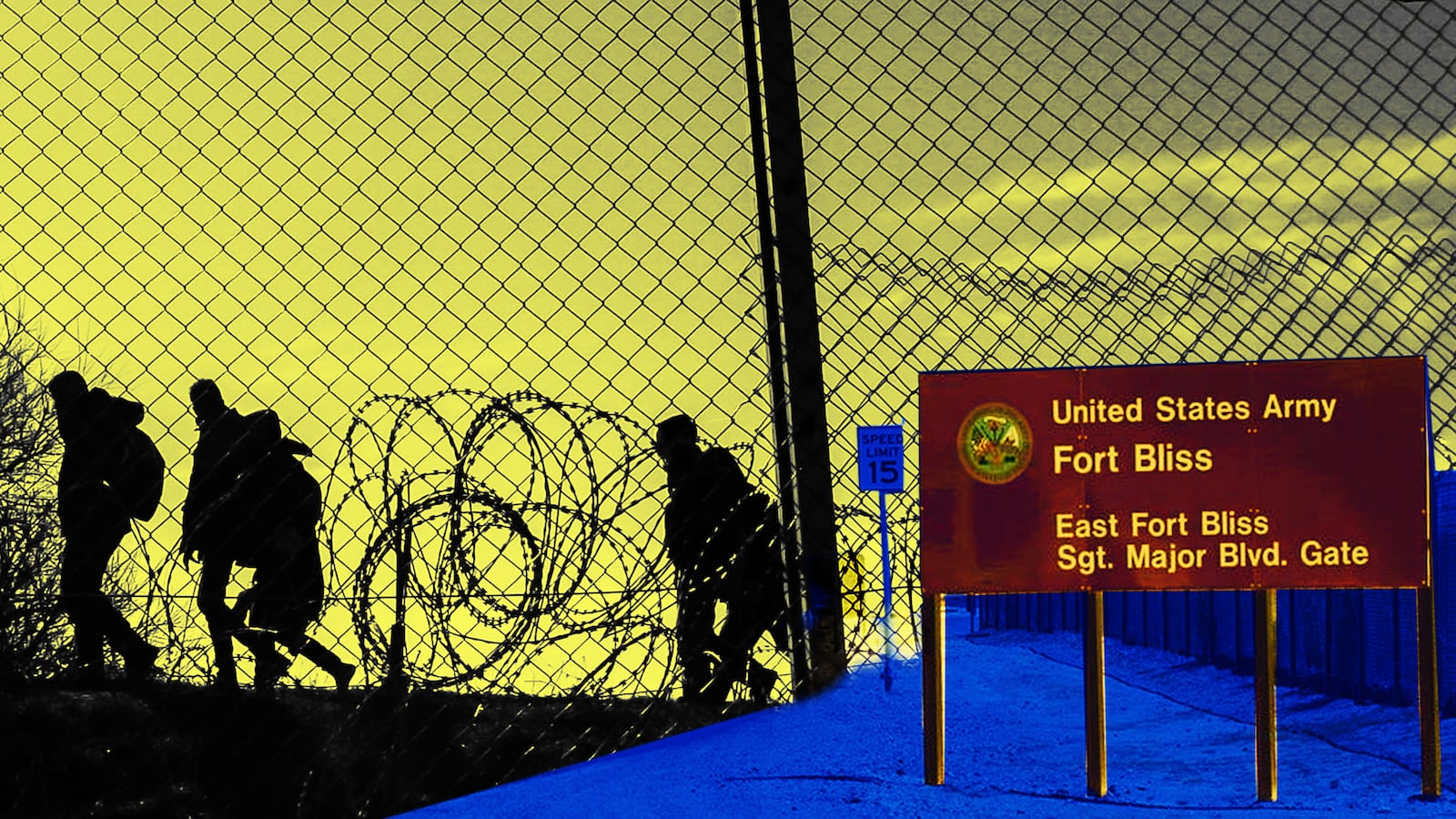Active-duty and retired U.S. military officers and enlisted personnel are expressing a sense of moral emergency over the Defense Department setting up detention camps for undocumented immigrants on military bases.
“It smacks of totalitarianism,” said Steve Kleinman, a retired Air Force colonel and military intelligence officer.
Raf Noboa, an Iraq War veteran and former Army sergeant, said he was astounded by the “enormous moral offense” the camps represent and which the military will be ordered to support.
“America’s military once liberated people from concentration camps,” Noboa told The Daily Beast. “It beggars the mind and our morality that it might be used to secure them.”
“I knew something bad was going to happen. I have always taken [President Trump]’s rhetoric at face value and right now, I’m not banking on the president having good will towards people of my nationality,” said an active-duty military officer of Mexican descent currently stationed at Fort Bliss in El Paso, one of the sites under consideration for the detention camps.
Following site visits to four military installations, mostly in Texas, by Department of Health and Human Services officials, Defense Secretary James Mattis said on Monday that the Department of Homeland Security had formally requested the Pentagon establish the camps at two bases, which Mattis called “temporary.”
A Defense Department source told The Daily Beast that one of camps will be Goodfellow Air Force Base in Texas, a major technical intelligence hub for the service. Both NPR and the Associated Press reported Goodfellow, as well as the Army’s Fort Bliss, are the selected installations. One will detain unaccompanied or administration-separated children and the other will detain families together. Pentagon representatives did not respond to repeated requests for comment.
A U.S. Air Force intelligence officer, who was formerly stationed at Goodfellow, told The Daily Beast that customs and immigration should not involve U.S. military installations unless there is a real threat to national security.
“The infrastructure of these bases aren’t all that great and it ensures almost complete anonymity for the program safely tucked behind gate and guard,” the intelligence officer said on condition of anonymity. “Not anyone in particular, but commanders can barely handle sexual assault, retirement ceremonies gone wrong, command overreach, and operational tempos. Are they going to be in charge of this? Goodfellow in particular was kicking students off base due to space concerns. [Goodfellow Air Force Base] also has water issues where everyone carries around jugs of water because the faucet tastes like you are drinking a spoon.”
The officer continued: “In short, having Manzanar [one of the sites of America’s World War II-era internment camps] 2018 on Goodfellow, or any other base, is a disaster that stands against everything the military value system is supposed to be. Seems to me the president and his administration are trying to use [Thank You For Your Service] equity here to cover up the black eye they got from bungling this.”
As The Daily Beast reported last week, the Trump administration is taking steps to militarize its detention of undocumented immigrants amid substantial criticism of the morality of his “zero tolerance” policy. President Trump tweeted on Sunday and Monday against providing accused undocumented immigrants with a legal process to adjudicate their claims, while Attorney General Jeff Sessions has requested military attorneys aid with immigration cases.
Mattis on Monday appeared to draw some distance from the policy by saying the military would be in a “logistics support response mode,” rather than an active jailor.
But to several active and retired servicemembers interviewed by The Daily Beast, establishing the detention camps on base wraps an unethical and questionably legal policy in the honor of military service. They considered the military to be placed in an agonizing situation that pincers soldiers and airmen between the need for military discipline and a policy harking back to the infamous detention of Japanese-Americans during World War II or the forcible separation of children of native nations after Wounded Knee.
“Even if military people aren’t directly participating in that practice, if they’re housing the children held hostage as part of this process, they’re part of an unjust and potentially unlawful enterprise,” said Paul Yingling, a retired Army colonel.
Yingling, an Iraq veteran, won widespread acclaim over a decade ago by penning a scathing criticism of Iraq-era generalship as complicit in a debacle. He was the deputy commander of the 3rd Armored Cavalry Regiment, a celebrated unit performing a counterinsurgency proof of concept in the town of Tal Afar. The unit’s commander was H.R. McMaster, Trump’s second national security adviser. (Yingling said he has not recently talked to McMaster.)
Yingling said that the dilemma facing servicemembers is that what he called a policy of “hostage-taking”—effectively, families seeking reunification of their children will have to renounce any asylum claims that brought them to the United States—was not unambiguously illegal. Without straightforward illegality, a soldier on Bliss or airman on Goodfellow cannot refuse to execute an order to aid with the detention, and Yingling expected that any noncompliance would promptly result in military discipline, if not prosecution. He predicted that “not a single flag officer would resign or otherwise raise a syllable of protest” if lower-ranking servicemembers face discipline for failing to support the camps.
“The Department of Defense is participating in a scheme that appropriates the concept of military honor to perpetrate a human rights abuse. DOD’s specific task might not be illegal, at least not unambiguously illegal. But DOD would be participating in hostage taking,” Yingling said. At the Pentagon, Yingling added, senior officials “have to decide, right now, if they’re going to participate in a clearly unethical and possibly illegal hostage scheme.”
The Bliss-stationed officer said it was “extremely stupid of the administration to consider Fort Bliss for a detention camp,” warning it would harm the base’s relationship with nearby El Paso, Texas.
“El Paso is literally right outside the gate. The El Paso community is heavily, overwhelmingly Mexican. Most commercial businesses won’t hire people that can’t navigate both English and Spanish. The border here is a formality. People go between El Paso and Juarez like New Yorkers go between neighborhoods,” said the officer, who spoke on condition of anonymity due to Pentagon restrictions on military personnel speaking to journalists.
“The community will not take this well, no matter how soldiers feel about it.”
A former guard at the Guantanamo Bay detention facility, retired Army specialist Brandon Neely, told The Daily Beast that sending undocumented children and families for on-base detention was “like Gitmo.”
“On base, there’s no access for reporters, and it’ll be even harder to get there than it is now. But the military should have no place in this,” said Neely. “It’s like [Trump] uses the military for whatever he wants. It’s not the military’s job to house immigrants in detention facilities.”
Kleinman, a former military intelligence officer and torture opponent, said on-base life would be substantially complicated, even if the military won’t be actively executing detention operations. Protests are likely outside the installations, straining guard resources and affecting commutes. As well, he said, it’ll be a “morale issue,” as servicemembers will not have signed up to detain adults and children who will at most have committed a civil misdemeanor by crossing the border illegally.
“Every person on Goodfellow Air Force Base in the military who’ll be helping manage, to secure, feed, to transport these immigrants have all, without except, taken an oath to support and defend the Constitution, but they will be abdicating their responsibilities,” Kleinman said.
“Is this truly a national security issue, of the type typically delegated to DOD? I don’t find myself worried at night that these little children are coming to steal our freedom.”
Noboa called the intended camps concentration camps, “regardless of what euphemisms we use to salve our souls,” and said they were an “excruciating dilemma” for the military, “for it corrodes our notions of moral courage, and places them in conflict with the necessity of maintaining discipline.”
Yingling said there was “no honorable way to serve in this administration,” and Mattis ought to have already resigned.
“Mattis is already lending his honor to perpetrate and further any number of not only unwise but unethical and potentially illegal activities,” Yingling said. “It’s never too late to stop perpetrating a crime. If Mattis wants to rescue what’s left of his honor, he can act today. Every day he chooses not to makes him more complicit.”






